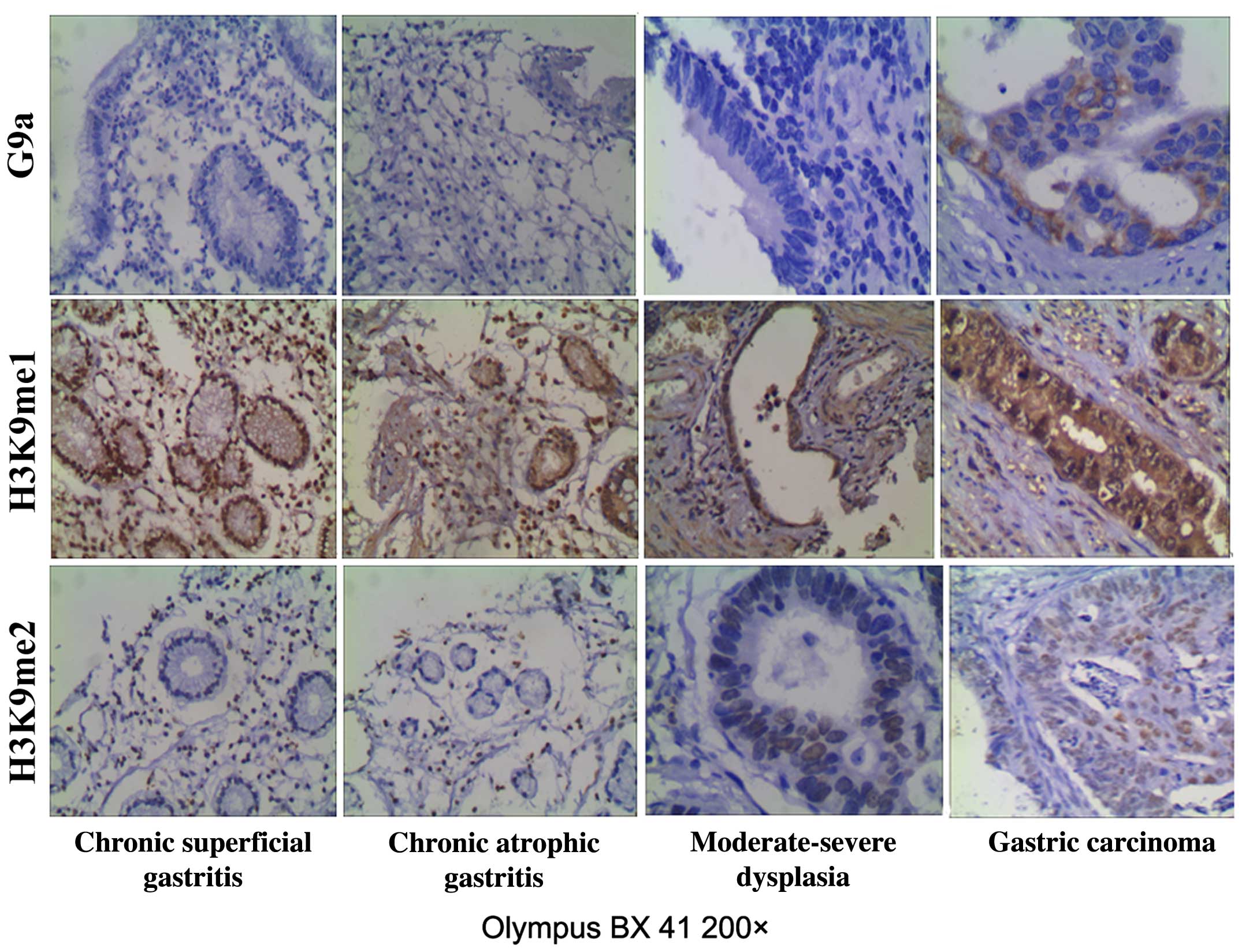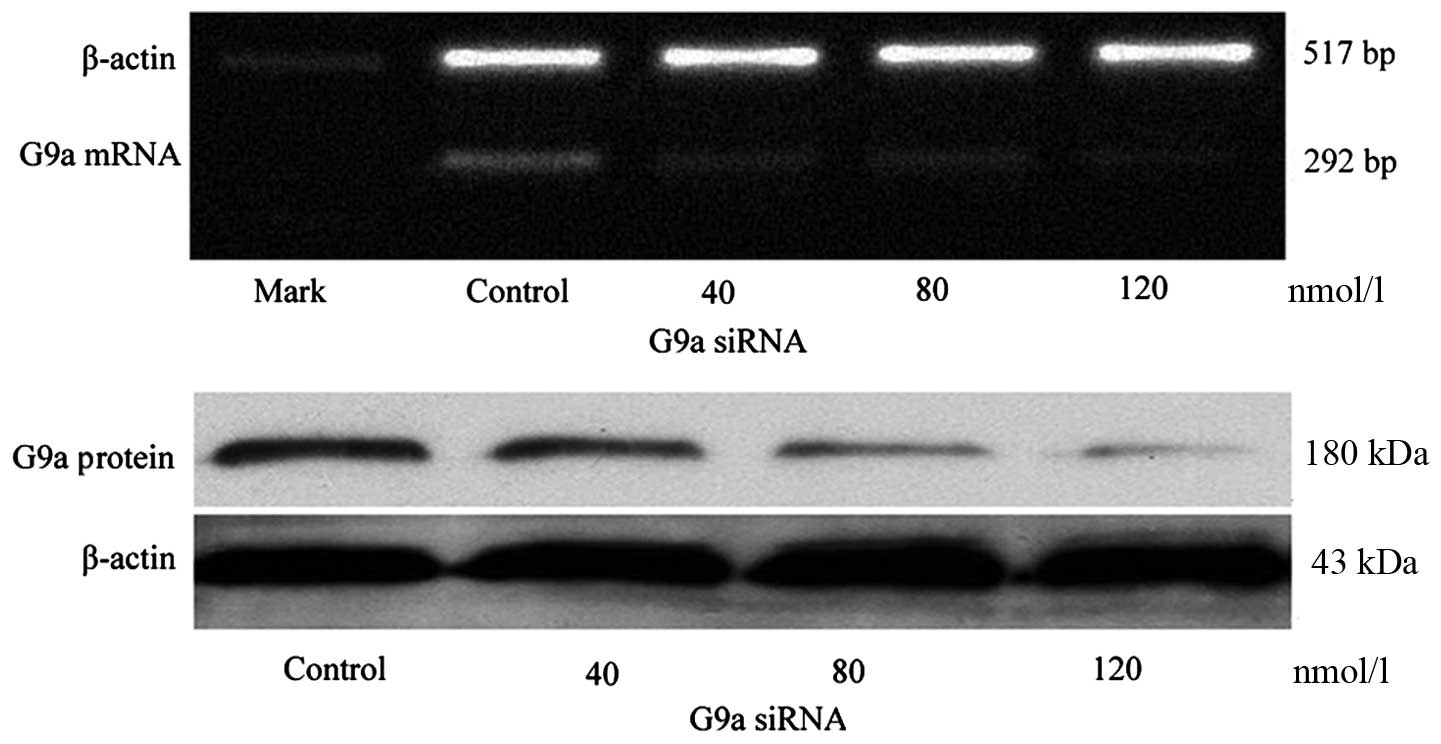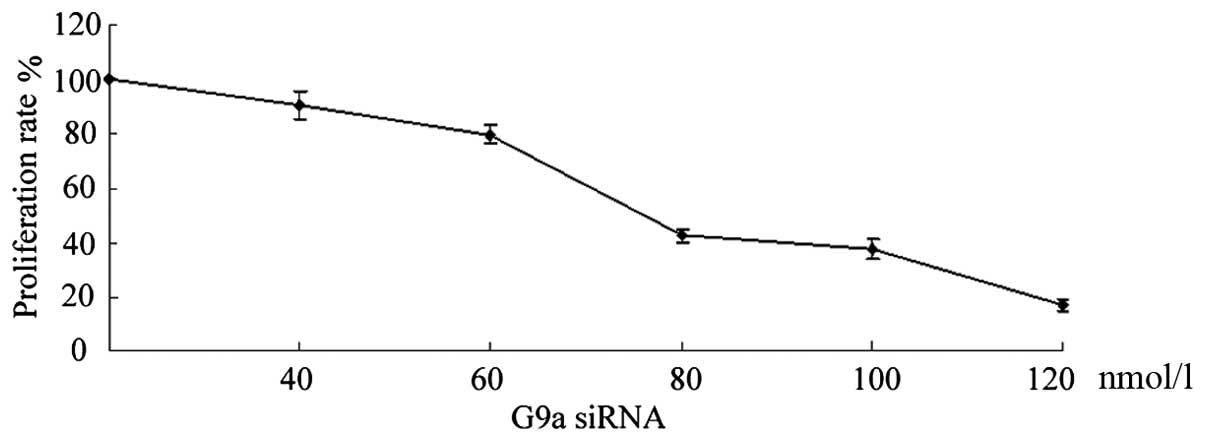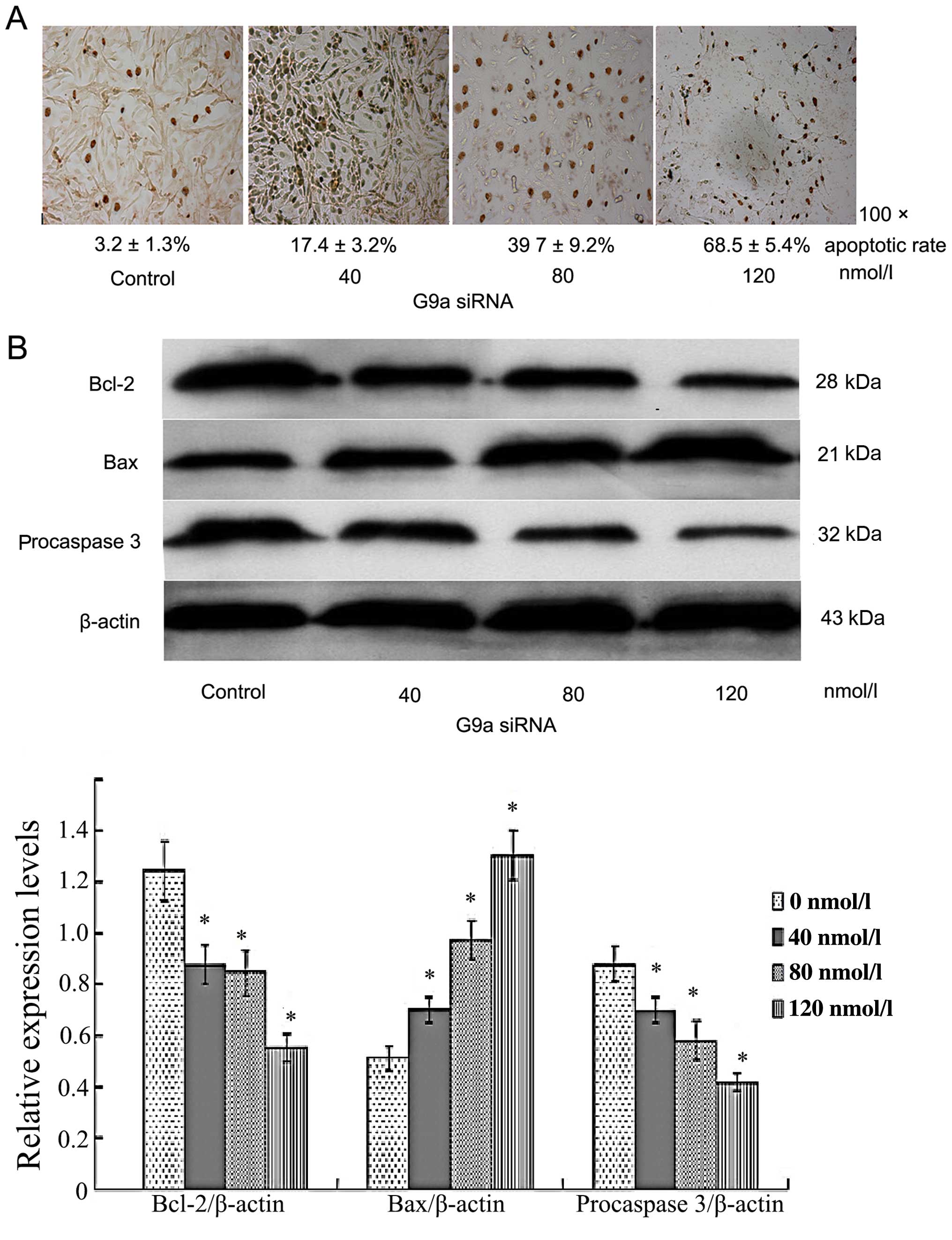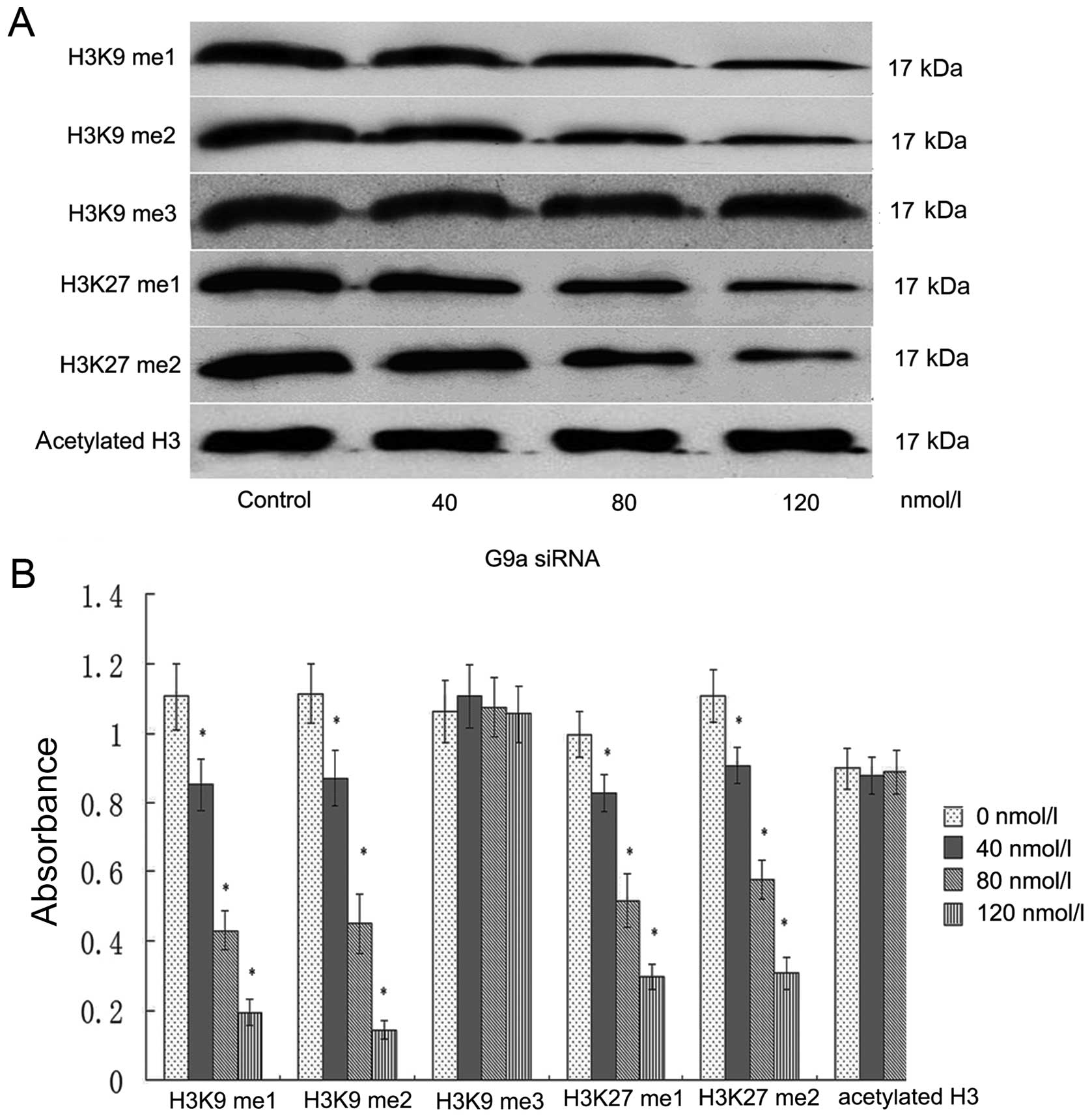|
1
|
Bannister AJ, Zegerman P, Partridge JF,
Miska EA, Thomas JO, Allshire RC and Kouzarides T: Selective
recognition of methylated lysine 9 on histone H3 by the HP1 chromo
domain. Nature. 410:120–124. 2001. View
Article : Google Scholar : PubMed/NCBI
|
|
2
|
Jacobs SA, Taverna SD, Zhang Y, Briggs SD,
Li J, Eissenberg JC, Allis CD and Khorasanizadeh S: Specificity of
the HP1 chromo domain for the methylated N-terminus of histone H3.
EMBO J. 20:5232–5241. 2001. View Article : Google Scholar : PubMed/NCBI
|
|
3
|
Lachner M, O'Carroll D, Rea S, Mechtler K
and Jenuwein T: Methylation of histone H3 lysine 9 creates a
binding site for HP1 proteins. Nature. 410:116–120. 2001.
View Article : Google Scholar : PubMed/NCBI
|
|
4
|
Kouzarides T: Chromatin modifications and
their function. Cell. 128:693–705. 2007. View Article : Google Scholar : PubMed/NCBI
|
|
5
|
Schneider R, Bannister AJ and Kouzarides
T: Unsafe SETs: Histone lysine methyltransferases and cancer.
Trends Biochem Sci. 27:396–402. 2002. View Article : Google Scholar : PubMed/NCBI
|
|
6
|
Aagaard L, Schmid M, Warburton P and
Jenuwein T: Mitotic phosphorylation of SUV39H1, a novel component
of active centromeres, coincides with transient accumulation at
mammalian centromeres. J Cell Sci. 113:817–829. 2000.PubMed/NCBI
|
|
7
|
Aagaard L, Laible G, Selenko P, Schmid M,
Dorn R, Schotta G, Kuhfittig S, Wolf A, Lebersorger A, Singh PB, et
al: Functional mammalian homologues of the Drosophila PEV-modifier
Su(var)3-9 encode centromere-associated proteins which complex with
the heterochromatin component M31. EMBO J. 18:1923–1938. 1999.
View Article : Google Scholar : PubMed/NCBI
|
|
8
|
Melcher M, Schmid M, Aagaard L, Selenko P,
Laible G and Jenuwein T: Structure-function analysis of SUV39H1
reveals a dominant role in heterochromatin organization, chromosome
segregation, and mitotic progression. Mol Cell Biol. 20:3728–3741.
2000. View Article : Google Scholar : PubMed/NCBI
|
|
9
|
O'Carroll D, Scherthan H, Peters AH,
Opravil S, Haynes AR, Laible G, Rea S, Schmid M, Lebersorger A,
Jerratsch M, et al: Isolation and characterization of Suv39h2, a
second histone H3 methyltransferase gene that displays
testis-specific expression. Mol Cell Biol. 20:9423–9433. 2000.
View Article : Google Scholar : PubMed/NCBI
|
|
10
|
Tachibana M, Sugimoto K, Fukushima T and
Shinkai Y: Set domain-containing protein, G9a, is a novel
lysine-preferring mammalian histone methyltransferase with
hyperactivity and specific selectivity to lysines 9 and 27 of
histone H3. J Biol Chem. 276:25309–25317. 2001. View Article : Google Scholar : PubMed/NCBI
|
|
11
|
Tachibana M, Sugimoto K, Nozaki M, Ueda J,
Ohta T, Ohki M, Fukuda M, Takeda N, Niida H, Kato H, et al: G9a
histone methyltransferase plays a dominant role in euchromatic
histone H3 lysine 9 methylation and is essential for early
embryogenesis. Genes Dev. 16:1779–1791. 2002. View Article : Google Scholar : PubMed/NCBI
|
|
12
|
Estève PO, Patnaik D, Chin HG, Benner J,
Teitell MA and Pradhan S: Functional analysis of the N- and
C-terminus of mammalian G9a histone H3 methyltransferase. Nucleic
Acids Res. 33:3211–3223. 2005. View Article : Google Scholar : PubMed/NCBI
|
|
13
|
Dong KB, Maksakova IA, Mohn F, Leung D,
Appanah R, Lee S, Yang HW, Lam LL, Mager DL, Schübeler D, et al:
DNA methylation in ES cells requires the lysine methyltransferase
G9a but not its catalytic activity. EMBO J. 27:2691–2701. 2008.
View Article : Google Scholar : PubMed/NCBI
|
|
14
|
Ikegami K, Iwatani M, Suzuki M, Tachibana
M, Shinkai Y, Tanaka S, Greally JM, Yagi S, Hattori N and Shiota K:
Genome-wide and locus-specific DNA hypomethylation in G9a deficient
mouse embryonic stem cells. Genes Cells. 12:1–11. 2007. View Article : Google Scholar : PubMed/NCBI
|
|
15
|
Ma X, Fang Y, Beklemisheva A, Dai W, Feng
J, Ahmed T, Liu D and Chiao JW: Phenylhexyl isothiocyanate inhibits
histone deacetylases and remodels chromatins to induce growth
arrest in human leukemia cells. Int J Oncol. 28:1287–1293.
2006.PubMed/NCBI
|
|
16
|
Lachner M, Sengupta R, Schotta G and
Jenuwein T: Trilogies of histone lysine methylation as epigenetic
landmarks of the eukaryotic genome. Cold Spring Harb Symp Quant
Biol. 69:209–218. 2004. View Article : Google Scholar
|
|
17
|
Jenuwein T: The epigenetic magic of
histone lysine methylation. FEBS J. 273:3121–3135. 2006. View Article : Google Scholar : PubMed/NCBI
|
|
18
|
Santos-Rosa H, Schneider R, Bannister AJ,
Sherriff J, Bernstein BE, Emre NC, Schreiber SL, Mellor J and
Kouzarides T: Active genes are tri-methylated at K4 of histone H3.
Nature. 419:407–411. 2002. View Article : Google Scholar : PubMed/NCBI
|
|
19
|
Chen MW, Hua KT, Kao HJ, Chi CC, Wei LH,
Johansson G, Shiah SG, Chen PS, Jeng YM, Cheng TY, et al: H3K9
histone methyltransferase G9a promotes lung cancer invasion and
metastasis by silencing the cell adhesion molecule Ep-CAM. Cancer
Res. 70:7830–7840. 2010. View Article : Google Scholar : PubMed/NCBI
|
|
20
|
Yuan Y, Tang AJ, Castoreno AB, Kuo SY,
Wang Q, Kuballa P, Xavier R, Shamji AF, Schreiber SL and Wagner BK:
Gossypol and an HMT G9a inhibitor act in synergy to induce cell
death in pancreatic cancer cells. Cell Death Dis. 4:e6902013.
View Article : Google Scholar : PubMed/NCBI
|
|
21
|
Kondo Y, Shen L, Suzuki S, Kurokawa T,
Masuko K, Tanaka Y, Kato H, Mizuno Y, Yokoe M, Sugauchi F, et al:
Alterations of DNA methylation and histone modifications contribute
to gene silencing in hepatocellular carcinomas. Hepatol Res.
37:974–983. 2007. View Article : Google Scholar : PubMed/NCBI
|
|
22
|
Cai L, Ma X, Huang Y, Zou Y and Chen X:
Aberrant histone methylation and the effect of Suv39H1 siRNA on
gastric carcinoma. Oncol Rep. 31:2593–2600. 2014.PubMed/NCBI
|
|
23
|
Steeg PS: Metastasis suppressors alter the
signal transduction of cancer cells. Nat Rev Cancer. 3:55–63. 2003.
View Article : Google Scholar : PubMed/NCBI
|
|
24
|
Seligson DB, Horvath S, Shi T, Yu H, Tze
S, Grunstein M and Kurdistani SK: Global histone modification
patterns predict risk of prostate cancer recurrence. Nature.
435:1262–1266. 2005. View Article : Google Scholar : PubMed/NCBI
|
|
25
|
Park YS, Jin MY, Kim YJ, Yook JH, Kim BS
and Jang SJ: The global histone modification pattern correlates
with cancer recurrence and overall survival in gastric
adenocarcinoma. Ann Surg Oncol. 15:1968–1976. 2008. View Article : Google Scholar : PubMed/NCBI
|
|
26
|
Wei Y, Xia W, Zhang Z, Liu J, Wang H,
Adsay NV, Albarracin C, Yu D, Abbruzzese JL, Mills GB, et al: Loss
of trimethylation at lysine 27 of histone H3 is a predictor of poor
outcome in breast, ovarian, and pancreatic cancers. Mol Carcinog.
47:701–706. 2008. View
Article : Google Scholar : PubMed/NCBI
|
|
27
|
Ding L, Erdmann C, Chinnaiyan AM, Merajver
SD and Kleer CG: Identification of EZH2 as a molecular marker for a
precancerous state in morphologically normal breast tissues. Cancer
Res. 66:4095–4099. 2006. View Article : Google Scholar : PubMed/NCBI
|
|
28
|
Bryant RJ, Cross NA, Eaton CL, Hamdy FC
and Cunliffe VT: EZH2 promotes proliferation and invasiveness of
prostate cancer cells. Prostate. 67:547–556. 2007. View Article : Google Scholar : PubMed/NCBI
|
|
29
|
Choi JH, Song YS, Yoon JS, Song KW and Lee
YY: Enhancer of zeste homolog 2 expression is associated with tumor
cell proliferation and metastasis in gastric cancer. APMIS.
118:196–202. 2010. View Article : Google Scholar : PubMed/NCBI
|
|
30
|
Min J, Zaslavsky A, Fedele G, McLaughlin
SK, Reczek EE, De Raedt T, Guney I, Strochlic DE, Macconaill LE,
Beroukhim R, et al: An oncogene-tumor suppressor cascade drives
metastatic prostate cancer by coordinately activating Ras and
nuclear factor-kappaB. Nat Med. 16:286–294. 2010. View Article : Google Scholar : PubMed/NCBI
|
|
31
|
Watanabe H, Soejima K, Yasuda H, Kawada I,
Nakachi I, Yoda S, Naoki K and Ishizaka A: Deregulation of histone
lysine methyl-transferases contributes to oncogenic transformation
of human bronchoepithelial cells. Cancer Cell Int. 8:152008.
View Article : Google Scholar
|
|
32
|
Wozniak RJ, Klimecki WT, Lau SS, Feinstein
Y and Futscher BW: 5-Aza-2′-deoxycytidine-mediated reductions in
G9A histone methyltransferase and histone H3 K9 di-methylation
levels are linked to tumor suppressor gene reactivation. Oncogene.
26:77–90. 2007. View Article : Google Scholar
|
|
33
|
Xin ZH, Ma HL, Wu SY and Dai CH:
Determination of the inhibitory activity of angiotensin-converting
enzyme inhibitor captopril by high performance capillary
electrophoresis. Yao Xue Xue Bao. 38:843–845. 2003.In Chinese.
|
|
34
|
Bachman KE, Park BH, Rhee I, Rajagopalan
H, Herman JG, Baylin SB, Kinzler KW and Vogelstein B: Histone
modifications and silencing prior to DNA methylation of a tumor
suppressor gene. Cancer Cell. 3:89–95. 2003. View Article : Google Scholar : PubMed/NCBI
|
|
35
|
Collins R and Cheng X: A case study in
cross-talk: The histone lysine methyltransferases G9a and GLP.
Nucleic Acids Res. 38:3503–3511. 2010. View Article : Google Scholar : PubMed/NCBI
|
|
36
|
Lee SH, Kim J, Kim WH and Lee YM: Hypoxic
silencing of tumor suppressor RUNX3 by histone modification in
gastric cancer cells. Oncogene. 28:184–194. 2009. View Article : Google Scholar
|
|
37
|
Estève PO, Chin HG, Smallwood A, Feehery
GR, Gangisetty O, Karpf AR, Carey MF and Pradhan S: Direct
interaction between DNMT1 and G9a coordinates DNA and histone
methylation during replication. Genes Dev. 20:3089–3103. 2006.
View Article : Google Scholar : PubMed/NCBI
|
|
38
|
Martin C and Zhang Y: The diverse
functions of histone lysine methylation. Nat Rev Mol Cell Biol.
6:838–849. 2005. View
Article : Google Scholar : PubMed/NCBI
|
|
39
|
Kondo Y, Shen L, Ahmed S, Boumber Y,
Sekido Y, Haddad BR and Issa JP: Downregulation of histone H3
lysine 9 methyltransferase G9a induces centrosome disruption and
chromosome instability in cancer cells. PLoS One. 3:e20372008.
View Article : Google Scholar : PubMed/NCBI
|
|
40
|
Czermin B, Schotta G, Hülsmann BB, Brehm
A, Becker PB, Reuter G and Imhof A: Physical and functional
association of SU(VAR)3–9 and HDAC1 in Drosophila. EMBO Rep.
2:915–919. 2001. View Article : Google Scholar : PubMed/NCBI
|















